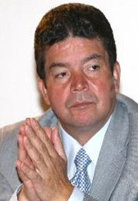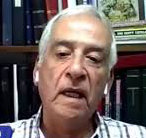COLOMBIA: HALF A CENTURY OF THE CGT |
.
ACTUALIDAD // Publicado el 02 de enero de 2021 // 12.00 horas, en Bogotá D.C.
.
In May 2021, the General Confederation of Labor (CGT) of Colombia will be in force for 50 years. In the midst of a world crisis and conditional stability, the world of production and labor relations is subject to unpredictable changes. In this framework, anyone can be the hardest hit and that, as has been recurrent throughout the historical period called Modernity, more rigorously affects workers and their organizations for the defense of rights and demands for expansion in the offer of justice and equality, typical of the discourse and promises of the Illuminism. The celebration that is approaching will make it possible to highlight the scenarios for reflection and recount on the path traveled by this Organization, by no means short as is evident. Regardless of the event, the entity's leadership hopes not only to maintain unity of action with other centrals in the country and in the continental and global sphere, but also to make its voice felt in international forums of its competence, such as the ILO (International Labor Organization) and other similar spaces. The risk situation in which humanity finds itself raises a necessary participation of workers in the changes that will definitively alter the course of the world, democracy and rights that are threatened by too many factors and operators of threats.
.
Written by: Rubén HIDALGO * (español // portugués)
.
It is considered that the CGT is currently the Colombian organization of union entities that gathers the largest number of members in the Andean country (one million, approximately). The conception that has guided its journey in the history of that society is linked in its beginnings with the social thought of the Church, to later become secular in its argumentative evolution, without forgetting those roots in its concern for the less endowed with the benefits of the aforementioned modern project. This implied in the institutional orientation and throughout the decades following its foundation, a manifest independence from any ideological chapel and from all forms of dissolving extremism. That will included vertical distance and the denunciation of all forms of dictatorship, including that of thought that now prevails in the region, with the abuse of freedoms. In the same way, it was done with those that overshadowed Latin America in recent history and that emerged from the barracks, with disastrous results both in the institutional sphere and in the balance of human victims and the rule of law.
.
This humanist vision led the Colombian trade union center to be linked to the Clat (Latin American Central of Workers), which between the 60s and 90s of the last century, guided those who within Latin American trade unionism remained outside any messianic narrative -including the which called for armed struggle - to insist on the search for all demands and protests within the game of democratic institutions and respect for difference. That is why it never adhered to or related to the convening of the so-called Sao Paulo Forum, largely the protagonist of more than one deinstitutionalization process, even in the present, among the countries on this side of the world. However, it has remained until today in a link of action with the other national trade union organizations, even when they have a different social and political vision from the CGT thought. Unity of action in defense of the less favored has been constantly one of the explicit slogans of the CGT, in accordance with its postulates and throughout its history.
.

Julio R. GÓMEZ E. (Q.e.p.d.) **
.--------------
Currently, the Organization is a member of the National Unemployment Committee and has participated with its affiliates in street demonstrations that have taken place throughout the country in the last year, although it has condemned the vandalism and terrorist actions that diverted the initial meaning of the protests called since the end of the previous year. According to the report in a book published by the CGT two years ago, it is defined as humanistic, concerted, self-managed and autonomous, in a specific enumeration of the values that, it is assumed, have guided its actions in its country of origin and in Latin America. Its current president is Julio Roberto Gómez, a leader who started from the base in the mid-1970s. At the beginning of this long history, the CGT had prominent leaders who guided the first steps. Figures such as Heliodoro Agudelo and Víctor Baena were among them. The latter was one of the protagonists of the remembered national strike of 1977, which marked a before and after of Colombian trade unionism in the aforementioned unity of action.
.
This central of workers has not only evolved in the capacity of insertion in the future and destiny of the Colombian country. Also, without its historical leaders perhaps having supposed it, it has fulfilled in this half century with a Hegelian maxim: "... to progress is to advance while conserving ...". It is not necessary to break with everything from the past in order to transform the present and the future. That is, it has maintained institutional vitality by contributing to a "... unionism of values and principles ...", as stated in the slogan of the regional entity that is known as Union Alternative of the Americas. An institution of a new model that the CGT of Colombia helped to form, with majority sectors of similar forces in Mexico and Brazil, among other powerful people from the Spanish and Portuguese-speaking continent. This organizational call comes not only in times of productive restriction due to the pandemic effect, but also due to changes in the modes of production and provision of services, which are inference and consequence of the impacts generated by cutting-edge technologies and alterations in the social habits, to understand politics and to face consumption.
,

Víctor BAENA L.
.----------
In the aforementioned world in crisis of which the CGT considers itself to be the protagonist in the possibility of providing criteria for solutions, a new historical cycle begins. That is one of their expectations on the threshold of a celebration not negligible in terms of the relief of experience and accumulated knowledge about social and labor, as well as political activities of Colombians in the specific and Latin Americans in general. In its current leadership there is a nucleus of base counselors with both middle and upper tertiary training, articulated with those who carry the accumulated traditions and the wisdom that they can contribute. Another maxim that is usually maintained in the academic sphere is fulfilled here: the articulation of the ex-veteran experience with the ex-nova renewal. This is, more or less, that no one can feel tempted and go unpunished, in an eventual impulse to "throw veterans out the window." The young presence in the CGT's orientation indicates not only the passage of time but also the inevitable generational shift that changes the perspectives regarding the environment, but not the strong core of the axis of thought: the strategic values that survived in half a century (aresprensa).
---------------
.
* Traducción al inglés : Frencie Carreón // Zamboanga // República de Filipinas
.
VÍNCULOS : MEDIO SIGLO DE LA CGT // COLÔMBIA: MEIO SÉCULO DA CGT
.-----------
.
.** En la víspera, 25 de enero de 2021, falleció en la ciudad de Bogotá D.C. don Julio Roberto Gómez Esguerra, presidente de la Confederación General del Trabajo de Colombia y prominente dirigente sindical latinoamericano. Luchó durante más de cuatro décadas por los derechos de los trabajadores de su país y de América Latina. Paz y memoria para un gran líder social.
.
